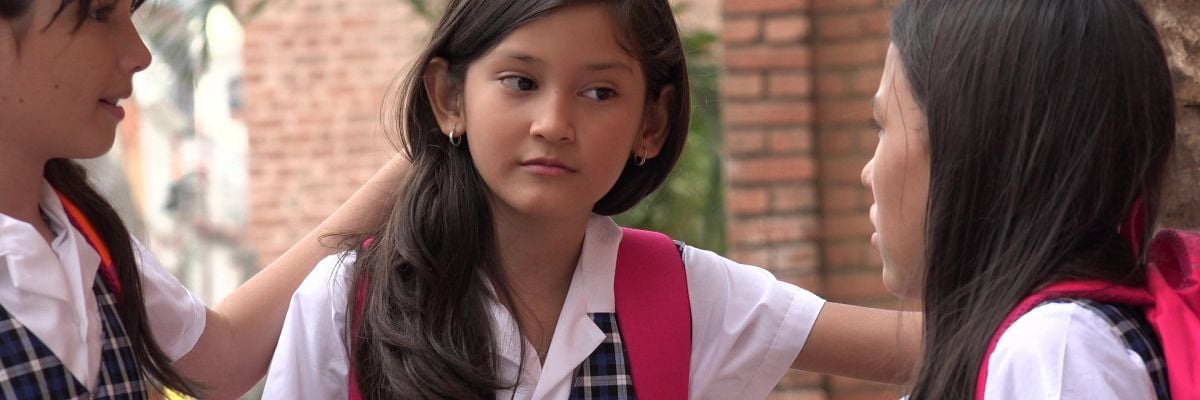
When I was young, my mom tried to enroll me in a Catholic elementary school, but I was turned away because my dad was Jewish and my mom was a fallen-away Catholic. The nuns said, “How can we raise your son to be a good Catholic when you’ll just undermine everything we’re teaching him?”
It’s rare to hear such a question from a Catholic school today, and that’s a shame. Catholic schools should not have to work against a student’s parents when it comes to teaching students the Faith.
I thought of this childhood incident recently when I read about a Catholic elementary school in Kansas that recently refused to admit a student whose parents are in a “same-sex marriage.” According to local news reports, supporters of the parents are petitioning the Archdiocese of Kansas City to reverse the decision, and have gathered over 1,000 signatures in an online petition.
This is not the first story of its kind. In 2010, Archbishop Chaput commented on a similar decision in his own archdiocese, saying:
Our schools are meant to be “partners in faith” with parents. If parents don’t respect the beliefs of the Church, or live in a manner that openly rejects those beliefs, then partnering with those parents becomes very difficult, if not impossible. It also places unfair stress on the children, who find themselves caught in the middle, and on their teachers, who have an obligation to teach the authentic faith of the Church.
Some people might object that the child did nothing wrong, so he or she shouldn’t be deprived of a Catholic education. But we must remember that it’s not the school depriving the child of a fully Catholic education: it is the child’s parents, who reject key elements of the Catholic faith. Their actions determine how their child will be educated.
Moreover, involving these parents in the life of a Catholic school would deprive other children of an authentic Catholic education. Archbishop Chaput continues:
Most parents who send their children to Catholic schools want an environment where the Catholic faith is fully taught and practiced. That simply can’t be done if teachers need to worry about wounding the feelings of their students or about alienating students from their parents. That isn’t fair to anyone—including the wider school community. Persons who have an understanding of marriage and family life sharply different from Catholic belief are often people of sincerity and good will. They have other, excellent options for education and should see in them the better course for their children.
Not everyone agrees. The editors of the National Catholic Reporter, for instance, have rushed to the critics’ defense. Echoing the authors of the petition, they claim that this decision does not reflect Jesus’ mercy and compassion, or his command to “let the children come to [him]” (Matt 19:14).
Jesus did care a great deal about the young and innocent, which is why he also condemned scandalous situations that could hurt them:
Whoever causes one of these little ones who believe in me to sin, it would be better for him to have a great millstone fastened round his neck and to be drowned in the depth of the sea. Woe to the world for temptations to sin! For it is necessary that temptations come, but woe to the man by whom the temptation comes! (Matt. 18:6-7).
Sometimes, people will respond to this argument by pointing out that we are all sinners who tempt each other—so it’s unfair to single out one group (like those involved in same-sex unions) that we should avoid. The editors at the Reporter pointedly ask:
Do [archdiocesan officials] inquire, since the fascination seems to be with sexual orientation (and no equivalence is intended here between sexual orientation and moral failure) and sexual ethics, of a couple’s use of artificial birth control? Pills? IUDs? Condoms? Tubal ligations? Vasectomies? Do they require a sworn affidavit about marital fidelity?
It’s true that we’re all grave sinners, but not all grave sins give scandal because they aren’t all equally public. It’s not obvious, for instance, when you look at the parents dropping off their youngsters or assemble at school gatherings, that Jake’s dad got a vasectomy or that Suzie’s mom is having an affair.
But in cases where serious sins are public, like when Jake’s dad publicly advocates on television for Planned Parenthood or Suzie shows up with her two moms, then a Catholic school is right to take steps to protect children’s innocence and to avoid giving scandal.
The Reporter editors try to head off this argument, too, by offering what they think are parallel cases:
[O]ne must ask if the school might prohibit the children of the Muslim mother who wears a hijab or the Orthodox Jewish father who wears a yarmulke, symbols of fervent religious belief that would not permit of consistency with Catholic teaching. Wouldn’t their children and others in the school be terribly confused? Or when it becomes widely known that a parent is a non-believer, maybe an ardent atheist, is his or her child sent packing?
Well, if an “ardent atheist” refuses to be a “partner in faith” because he ridicules the very idea of faith, then maybe godless government schools would be a better fit for him. In any case, a Catholic school should not be forced to welcome such an influence to its community.
When it comes to non-Christian students: it is one thing for a child to be exposed to Jewish classmates to whom “the gifts and the call of God are irrevocable” (Rom. 11:29) or Muslims who acknowledge “one, merciful God, mankind’s judge on the last day” (CCC 841). But it is quite another to expose children to people who unapologetically engage in “acts of grave depravity” that are “contrary to the natural law” to which, “tradition has always declared intrinsically disordered” (CCC 2357).
Ironically, the idea of keeping grave evil hidden for the sake of common decency is found in a letter of the Bible that the critics cite in their own petition.
They ask us to remember Ephesians 4:2-3, which says, “With all lowliness and meekness, with patience, forbearing one another in love, eager to maintain the unity of the Spirit in the bond of peace.” However, in the next chapter Paul says, “Immorality and all impurity or covetousness must not even be named among you, as is fitting among saints” (5:3) and, “It is a shame even to speak of the things that they do in secret” (5:11-12).
Catholic education is not mainly about wearing uniforms and learning fun Bible stories. It’s about being formed and strengthened to be a witness of Christ to the world. This involves not just being raised to avoid sins that lead to eternal damnation but being equipped to evangelize a world shrouded in darkness.
Admittedly, that’s heavy stuff, which is why very young children who can’t even commit a mortal sin (like the kindergarteners at the center of this news story) should not have to worry about these kinds of sins. That’s why the Pontifical Council for the Family teaches, “Homosexuality should not be discussed before adolescence unless a specific serious problem has arisen in a particular situation.”
Simply put: Kindergartners should not even know about sexual disorders or have these explained to them—or be put in a position, such as in a school that welcomes same-sex parents, where it must be explained to them. Of course we should pray for and try to help any child being raised in an environment that normalizes grave evil, but that does not justify introducing that environment into the lives of children who are just beginning their journey of faith.



